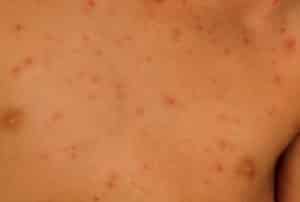Chickenpox is common and mostly affects children, but you can get it at any age. It usually gets better by itself after 1 to 2 weeks without needing to see a GP.
Chicken pox is the varicella zoster virus. It is very contagious 1-2 days prior to the rash appearing up until rash scabs over usually after 5-6 days. Symptoms can start between 1 to 3 weeks after exposure.
Stage 1: small spots appear
The spots can:
- be anywhere on the body, including inside the mouth and around the genitals, which can be painful
- spread or stay in a small area
- be red, pink, darker or the same colour as surrounding skin, depending on your skin tone
- be harder to see on brown and black skin
Stage 2: the spots become blisters
The spots fill with fluid and become blisters. The blisters are very itchy and may burst.
Stage 3: the blisters become scabs
The spots form a scab. Some scabs are flaky while others leak fluid.
Other symptoms
Before or after the rash appears, you might also get:
- a high temperature
- aches and pains, and generally feeling unwell
- loss of appetite
Chickenpox is very itchy and can make children feel miserable, even if they do not have many spots. The chickenpox spots look the same on children and adults. But adults usually have a high temperature for longer and more spots than children. It’s possible to get chickenpox more than once, but it’s unusual.
DO
-
drink plenty of fluid (try ice lollies if your child is not drinking) to avoid dehydration
-
take paracetamol to help with pain and discomfort
-
cut your child’s fingernails and put socks on their hands at night to stop them scratching
-
use cooling creams or gels from a pharmacy
-
speak to a pharmacist about using antihistamine medicine to help itching
-
bathe in cool water and pat the skin dry (do not rub)
-
dress in loose clothes
DON’T
-
do not use ibuprofen unless advised to do so by a doctor, as it may cause serious skin infections
-
do not give aspirin to children under 16
-
do not go near newborn babies, people who are pregnant and people with a weakened immune system, as chickenpox can be dangerous for them
-
do not scratch the spots, as scratching can cause scarring
Get advice from 111 now if:
- the skin around the chickenpox blisters is hot, painful and red, but redness may be harder to see on brown or black skin
- your child has chickenpox and is dehydrated
- chickenpox symptoms suddenly get worse
- you’re pregnant and have not had chickenpox before, or you’re not sure, and you’ve been near someone with chickenpox
- you have a weakened immune system and have been near someone with chickenpox
- you think your newborn baby has chickenpox
Some people may be able to take medicine to prevent complications. It needs to be started within 24 hours of the spots appearing.
111 will tell you what to do. They can arrange a phone call from a nurse or doctor if you need one. Go to 111.nhs.uk or call 111.
Further information on symptoms, photos of chickenpox on different coloured skins and treatment.




